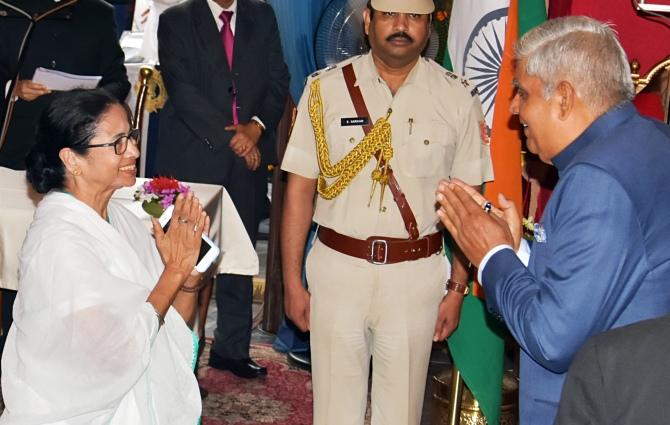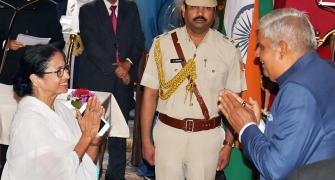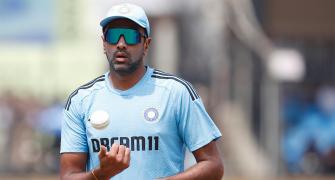What makes Dhankar so outspoken? Could it because as governor he will be in the driver’s seat if the Trinamool Congress performs below par in the elections next year?
Shikha Shalini reports.

In the political climate where exchanges between chief ministers of opposition-ruled states and governors are marking a new normal, the bitterness between the elected head of the government and the representative of the Union government in West Bengal has touched new lows.
West Bengal Chief Minister Mamata Banerjee recently told Governor Jagdeep Dhankar that he had no power to interfere with internal administration and accused him of addressing her in an “unparliamentary tone”.
He responded on Twitter and through letters reminding observers at large about “the chief minister’s duty to the governor and the Centre”.
Dhankar has been vocal against the state government’s handling of the Covid-19 pandemic.
The Bharatiya Janata Party, too, has been critical of the state government, especially its stance of non-cooperation with the central teams despatched to Kolkata to monitor the state government’s management of the infection.
What makes Dhankar so outspoken?
A noted Supreme Court advocate, Dhankar has interpreted his gubernatorial duties seriously and aggressively.
He said he was getting disturbing reports about the state’s public distribution system, coronavirus-linked fatalities, and the condition of health workers.
"Dhankar actively supports the Centre’s point and the BJP’s agenda. This situation unfolds just a year before the assembly polls in the state,” a political observer said.
Dhankar’s affiliation with the BJP and the Rashtriya Swayamsevak Sangh is relatively new.
He served as Lok Sabha MP from 1989 to 1991 as a member of the Janata Dal.
Being a Jat, he had developed a good rapport with former deputy prime minister Devi Lal and former PM V P Singh.
His nomination as a Lok Sabha candidate came after Devi Lal's strong recommendation.
Interestingly, despite Devi Lal playing a central role in edging out Chandra Shekhar in favour of V P Singh for PM in 1989, Chandra Ahekhar appointed Dhankar as MoS parliamentary affairs (1990-91).
Dhankar maintained a good relationship with former vice-president Bhairon Singh Shekhawat also (a Mercedes and other vehicles in his garage were kept at Shekhawat’s disposal for his political campaign).
He was a Congress MLA from Kishangarh (Rajasthan) from 1993 to 1998.
Political analysts say though he was never a mass leader, his networking skills, especially his friendship with former finance minister Arun Jaitley, led to his appointment as West Bengal governor.
The turning point in his political career was the Ajmer Sharif Dargah blast case.
Some members of the RSS and the Vishva Hindu Parishad were accused.
"A central team was formed by the organisation to defend and monitor the case.
"Bhupendra Yadav was given a key role and Dhankar helped him legally from behind the scenes," said a former member of the RSS.
Yadav, a Rajya Sabha member from Rajasthan, was also government counsel for the Liberhan Commission, set up to probe the demolition of Babri Masjid.
It was thought that Dhankar’s experience and connections in the Supreme Court would be helpful.
In Rajasthan, he was known for his criminal law practice and was the youngest president of the Rajasthan High Court Bar Association.
He was one of Salman Khan’s lawyers in the controversial blackbuck hunting case in Jodhpur.
He was part of a student delegation that went to Russia on the invitation of the youth wing of the Russian Communist Party in the 1970s.
Jaitley represented the RSS's student wing, Akhil Bharatiya Vidyarthi Parishad there. That’s how they first met.
Randeep Dhankar, his brother, is in the Congress and is considered the right hand man of Ashok Gehlot, chief minister of Rajasthan.
One of his more controversial statements was that the Mahabharata’s key character Arjuna’s arrows were fitted with “nuclear power”. Guess who Arjuna is, in this parallel!
Recently in a letter to the governor, Banerjee quoted the Sarkaria Commission's recommendations and observations to argue that the governor had no powers compared to the elected government.
Dhankar will be in the driver’s seat if the Trinamool Congress performs below par in the elections next year.










